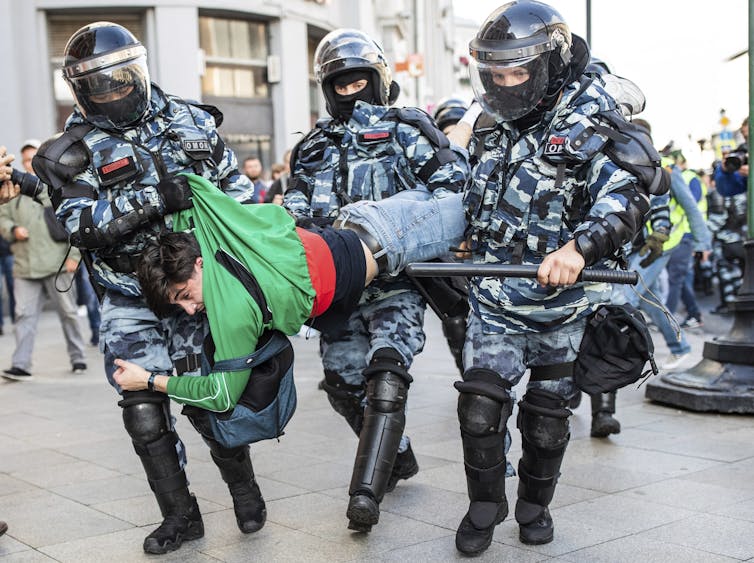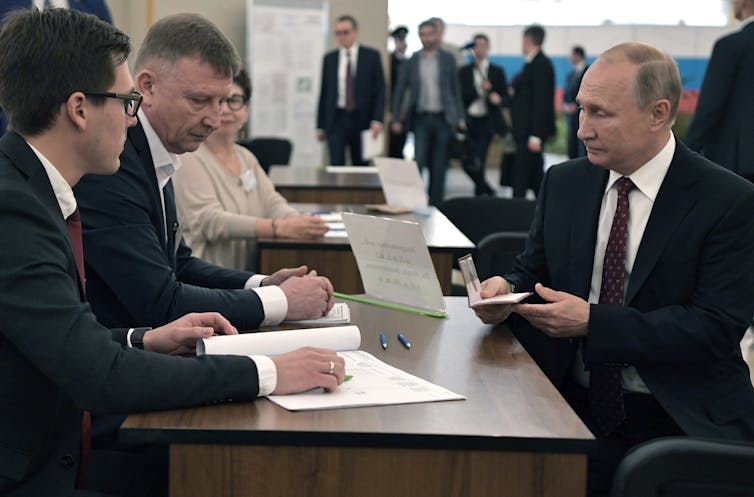Moscow’s municipal elections illustrate the growing political crisis in Russia
- Written by Regina Smyth, Associate Professor of Political Science, Indiana University
Russian President Vladimir Putin’s ruling party, United Russia, eked out a majority in the Moscow municipal legislature in elections[1] on Sept. 8.
While Putin’s regime touted the outcome as a victory, the election posed a significant challenge to what is called Putinism[2], a system that emerged in Putin’s second term to reassert Kremlin control over Russian politics. It included the creation of a dominant party, United Russia[3], in 2001, and the centralization of political power in the Kremlin.
Putinism relies on the president’s popularity to ensure regime stability.
United Russia may have won, but the fact that the election was so close revealed the party’s weakness[4] and challenged its absolute control over policy. As a scholar[5] of Russian politics, I believe the result suggests a looming political crisis as Russia looks toward national elections in 2021 and 2024.
Unexpected power
President Putin’s 2014 annexation of the Crimean Peninsula and incursion into Eastern Ukraine generated a rally-around-the-flag effect[6], and revived his presidency.
But by 2017, normal politics returned. A protracted recession and declining wages created popular discontent. Trust in President Putin[7] fell to its lowest level since 2006.
In Moscow, citizens contested dangerous pollution from trash incineration[8]. A policy to tear down Moscow’s Soviet-era housing[9] also produced large protests. Young supporters of opposition leader Alexey Navalny[10] demonstrated to contest corruption. A year later, they protested when the Central Election Commission barred Navalny from running[11] in presidential elections.
Rising protest and September’s close election demonstrated the opposition’s growing capacity to capitalize on discontent.
Since the nationwide protests demanding fair elections in 2011 and 2012, opposition leaders, including Navalny’s team, have continuously reinvented campaign models[12].
Activists meet voters in their neighborhoods and on public transport. They link online activism to off-line persuasion. Rather than preach regime change, the campaigns reflect citizens’ everyday concerns.
 Police detain a man during a political protest about upcoming elections in Moscow, Aug. 10, 2019.
AP/Evgeny Feldman, Meduza[13]
Police detain a man during a political protest about upcoming elections in Moscow, Aug. 10, 2019.
AP/Evgeny Feldman, Meduza[13]
Linking protest and elections
Regime controls have meant that until the recent election, opposition victories have been few.
Yet, new strategies to foil the Putin machine’s election interference have built momentum. In 2017, Moscow’s opposition used new models of campaigning[14] to score unexpected wins in neighborhood council elections. This summer a slate of young candidates employed a similar model, cooperating to collect signatures to surpass high ballot registration hurdles.
Their efforts made politics relevant for voters alienated by corrupt elections. The effect was strongest among young people[15].
Fearing loss, Russia’s Central Electoral Commission controlled by Putin and his party barred 30 opposition candidates from competing[16]. Bureaucrats relied on outdated information and mistakes in the states’ lists to disallow valid signatures.
Handwriting experts[17] identified signatures allegedly forged by a single person. Used against the entire opposition slate, these tactics raised alarms.
The opposition called supporters to the streets. Throughout Moscow’s hot summer, police repression escalated. On July 27, more than 1,300 demonstrators were arrested[18]. Some detainees, charged with rioting, faced long prison sentences. Pollster Denis Volkov found that the level of police violence discouraged even regime supporters[19].
Support for the opposition grew. On Aug. 10, more than 60,000 Muscovites took to the streets to support fair elections. This was the largest protest since 2012.
Linking elections and protest is a crucial element of opposition strategy. Capitalizing on protest crowds and press attention, Navalny created a digital Smart Vote[20] tool. Voters registered at the website and received a text identifying a candidate who could win against a United Russia rival. The system leveraged a common strategy in developed democracies: asking voters to support their second choice to prevent the victory of a less preferred candidate.
But Smart Vote also renewed conflict among opposition leaders[21]. Many feared that popular support for candidates from nondemocratic organizations such as the Communist Party compromised opposition morality[22]. Yet, for Muscovites wary of increased repression[23], Smart Vote provided a safe way to express opposition.
 Russian President Vladimir Putin waits for his ballot at a polling station during a city council election in Moscow, Russia, Sept. 8, 2019.
AP/Alexei Nikolsky, Sputnik, Kremlin Pool Photo[24]
Russian President Vladimir Putin waits for his ballot at a polling station during a city council election in Moscow, Russia, Sept. 8, 2019.
AP/Alexei Nikolsky, Sputnik, Kremlin Pool Photo[24]
Citizens respond
While Smart Vote did not increase turnout, it influenced the election’s outcome. Putin’s party may still have won a majority, but it lost a lot of races.
Anticipating popular backlash against United Russia, party candidates threw off the label and ran as independents[25]. Despite this ploy, the party lost 15 of its 40 seats. Voters ousted high-profile candidates such as Andrey Meletsky[26], the chairman of the Moscow United Russia Organization.
Opposition strategy created important longer-term dynamics. The opposition faction in the City Council rose from 12.5% to 44%, revealing Russians’ potential to make demands on government. Around the world, when biased elections become competitive, disengaged voters quickly reengage[27].
Controlled elections should not be assessed solely in terms of winners and losers. The contest was a battle of strategy won by the opposition. The regime was forced to create a legal way for state candidates to run as independents. The change provided an opportunity for opposition inroads.
The election also shaped national leadership battles. Moscow Mayor Sergei Sobyanin is seen as a potential successor to Vladimir Putin in 2024. His inability to stop protests or safeguard vote support led Kremlin rivals to attack him[28]. The election also undermined Prime Minister and United Russia party leader Dmitry Medvedev, a close Putin ally.
Regime weakness
Moscow’s recent elections illustrate an inherent challenge in nondemocratic elections. Despite extensive advantages, autocrats’ electoral strategies can reveal new evidence of opposition strength. Banning opposition candidates demonstrates incumbents’ fears about their popularity.
Voters responded by protesting and voting against the regime’s candidates. This election revealed that the old system of electoral control is breaking down.
Yet, one election does not suggest imminent revolution. Russian voters remain wary of sudden change. The Kremlin has proven adept at strategic adaptation. Its challenges to Google and Facebook[29] are one way to short-circuit Smart Vote copycats. The raids against Navalny allies[30] across the country suggest a more aggressive tactic.
But increased repression makes Putinism appear brittle. Russian voters are looking beyond President Putin and Putinism for solutions to everyday problems. The opposition has given unexpected voice to their demands.
For the Kremlin, this challenge raised the cost of winning elections through manipulation.
[ Deep knowledge, daily. Sign up for The Conversation’s newsletter[31]. ]
References
- ^ eked out a majority in the Moscow municipal legislature in elections (www.vox.com)
- ^ Putinism (www.journalofdemocracy.org)
- ^ United Russia (www.britannica.com)
- ^ election was so close revealed the party’s weakness (meduza.io)
- ^ scholar (scholar.google.com)
- ^ rally-around-the-flag effect (www.washingtonpost.com)
- ^ Trust in President Putin (www.rferl.org)
- ^ dangerous pollution from trash incineration (www.vice.com)
- ^ Moscow’s Soviet-era housing (www.nytimes.com)
- ^ Young supporters of opposition leader Alexey Navalny (www.rferl.org)
- ^ Central Election Commission barred Navalny from running (www.npr.org)
- ^ campaign models (www.ponarseurasia.org)
- ^ AP/Evgeny Feldman, Meduza (www.apimages.com)
- ^ new models of campaigning (www.themoscowtimes.com)
- ^ among young people (www.levada.ru)
- ^ 30 opposition candidates from competing (www.rferl.org)
- ^ Handwriting experts (meduza.io)
- ^ 1,300 demonstrators were arrested (www.vox.com)
- ^ discouraged even regime supporters (www.levada.ru)
- ^ Smart Vote (www.politico.eu)
- ^ conflict among opposition leaders (www.themoscowtimes.com)
- ^ opposition morality (www.nytimes.com)
- ^ Muscovites wary of increased repression (www.rferl.org)
- ^ AP/Alexei Nikolsky, Sputnik, Kremlin Pool Photo (www.apimages.com)
- ^ ran as independents (www.politico.eu)
- ^ Andrey Meletsky (meduza.io)
- ^ disengaged voters quickly reengage (www.cambridge.org)
- ^ attack him (www.themoscowtimes.com)
- ^ Google and Facebook (meduza.io)
- ^ raids against Navalny allies (meduza.io)
- ^ Sign up for The Conversation’s newsletter (theconversation.com)
Authors: Regina Smyth, Associate Professor of Political Science, Indiana University

